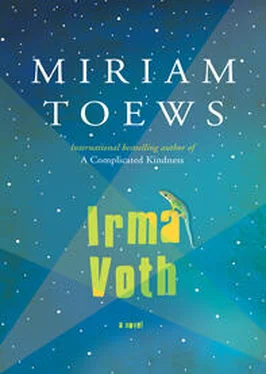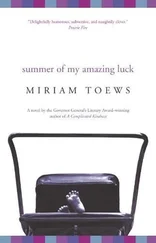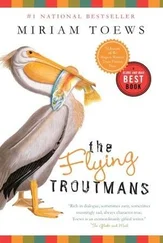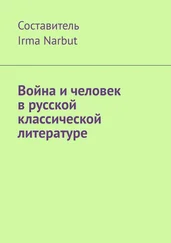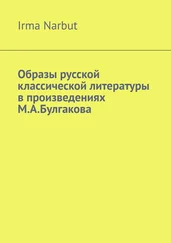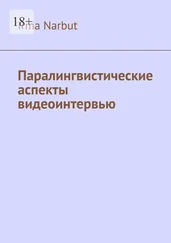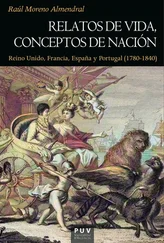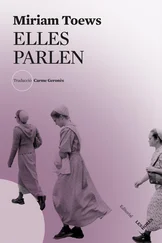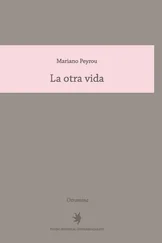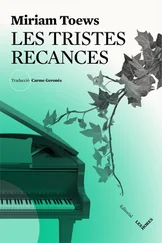Are they still tying shit together? I asked.
Yeah, and hiding shoes, she said. She told me that already my father was fighting with the director of the movie.
He’s here now? I said.
He came early, said Aggie. Mom and I listened to him talking with Dad in the kitchen. Dad said he’d shoot his dog if it attacks the cows or even if he sees him in the cornfields. He’s a fighting pit bull from Mexico City, Irma, and the director said he’s got a haunted soul and a natural sweetness, and he’ll play in the movie as a dog of the family. Dad told him that no family here has a fighting dog from Mexico City and especially not one with a soul and that’s the first sign the director doesn’t know what he’s doing.
Aggie told me the director said he had invested almost all of his own money into his art, into making this film about beautiful people in a beautiful part of the world, and that he has nothing but respect and admiration for the Mennonites. My father asked the director if the dog was really there purely for protection. He accused the director of lying to him. That the dog was there to protect his expensive camera equipment. The director denied that and said no, the dog would be an integral part of the film. Aggie said that our father told the director that films were like beautiful cakes, filled with shit.
How can he say that when he’s never seen them? I asked her.
He says art is a lie, said Aggie.
We sat on the fence and stared at things. Artless things. Things that were true. Things that belonged to ourselves and to each other. The clouds, our clothing, my hands. A bird flying over us had two long twigs in its mouth and he dropped one so that it landed directly at our feet like it was a gift. Here you go, Mennonite girls, prepare a nest. Or maybe it was an attack.
Dad says you believe in God but not an afterlife, said Aggie. He says that’s impossible.
That’s not remotely accurate, I told her. I never said that.
Frieda’s dad drove his truck the wrong way down the highway to Cuauhtémoc, said Aggie.
What a moron, I said.
No, she said, he killed himself.
On purpose? I said.
I don’t know, said Aggie. Didn’t he drive there all the time? Did they secretly reverse the directions?
What are they gonna do? I said.
Who knows, said Aggie. Get a new truck? Katharina at school said he owed money to narcos.
Aggie, I said.
Well, how should I know? she said. Oh, I have this for you. She pulled a tiny infant’s undershirt out of her pocket. There was a small faded flower on the collar. You wore it in Canada if you were a baby, she said. Mom told me to give it to you.
Thanks, I said. When I was a baby.
When you were a baby? said Aggie. English is such a prick.
You’re pretty good at it, I said.
Oh, and this is from her too, she said, and kissed me on the cheek.
Get lost, I said.
Can I come live with you, Irma? said Aggie.
Well, I said, are you looking for a quick and easy way to complicate your life forever?
Maybe I could live with you secretly, she said.
We sat quietly. We heard cows practising their English, trying with no luck to form words.
What’s he trying to say? said Aggie.
Help, I said. Our own stupid joke.
I told her to go before it got so dark she’d fall into the ditch on her way home but she didn’t move. Aggie ignores all my advice, as though she were determined to live successfully, and we sat on the fence for a long time. Then we started to get stiff from sitting and began to kick each other lightly in the dark.
When are they moving in? I asked Aggie.
I don’t know, she said. Tonight.
My power was still off and I couldn’t find the flashlight that Jorge had given me. I thought about bringing a cow into the house for company, just one. A small one. Or I could sleep in the barn like Jesus but without the entourage or the pressure to perform. I lay in my bed thinking of ways I could make Jorge happy if he ever came home again. One was: wash my feet before going to bed and dry them completely. The other one was: be hotter. It was true, what Jorge had said, that we weren’t kids anymore. I loved chasing him around fields and having dried turd fights and hiding in the corn while he looked for me and planning our future together in the Yucatán in a lighthouse with round rooms and a pole in the middle that we would use to slide down from the top floor directly into a boat that with one shove would put us out to sea. I told him we could call the boat Katie but he said he’d have to name it after his mother and even that was okay with me, I didn’t argue. I knew I would be alone for the rest of my life if Jorge didn’t come back to me. No boy from any of the Mennonite colonies would want a woman who’d been married and abandoned and especially one who’d been married to a Mexican.
I decided to go out and spy on my family from the roof of their grain shed. I could see directly into their large room. I thought about throwing myself off the roof of the grain shed and onto the roof of the outdoor kitchen which they’re not using now and lying there, dead, for months, invisible but toxic.
I wondered how long it would take them to find me. Then I remembered that they wouldn’t be looking. Well, maybe Aggie would be looking, but that’s the thing that stopped me from doing it. I had one question of myself: how do I preserve my dignity when nobody else is watching? By believing in a happy ending, I told myself. I had to get out of the house.
I stood in my yard and noticed the lights on at my cousins’ old place. The filmmakers had arrived. And then I heard voices and music and laughter and I had never felt more alone and strange in my life, which is something. I went back into my house and lay in my bed some more and tried to pray. God, I said, help me to live. Help me to live, please. Please God, help me to live. God, I need your help. I need to live. Please? I need help living. God. Help. I had never learned how to pray properly. It didn’t make sense that God would require me to articulate my pain in order for him to feel it and respond. I wanted to negotiate a deal. I knew I wasn’t supposed to talk to the filmmakers but wondered if it would be acceptable to observe them from a distance. I punched myself on the side of my head. What difference did it make what my father had said? I posed another question to myself. How do I behave in this world without following the directions of my father, my husband or God? Does it all end with me sleeping in a barn with cows and creeping around the campo spying on people from the roofs of empty grain sheds?
I got up again and went outside and crept along in the darkness towards the filmmakers’ house. I leaned against the water pump in the side yard and watched while several guys unloaded a million black boxes from a truck and a car and a van and carried them into the house. All the lights were on and the filmmakers were laughing and talking loudly and music was playing from somewhere inside. A dog was barking. In fact, a dog was barking and running at me in the dark and it looked like his eyes were on fire and I could see sparks flying out of them. I thought, well, I should run now, but I couldn’t move, I was galvanized to the pump, and then I heard a man yell, Oveja, Oveja!
Which is how I met Diego, the director of the film.
Vive aquí? he said. He was kneeling, looking up at me, and holding on to Oveja’s collar.
No, I said. Well, yes. Over there. I pointed. I tried to smile. I shook with fear. I may have bitten off a piece of my own tongue.
Me llamo Diego, said Diego.
Irma, I said.
Mucho gusto, Irma.
Mucho gusto.
Diego released Oveja and the dog wandered back to the house and Diego and I stood in the dark by the pump. He spoke quickly and precisely but his voice was soft, as though he were helping me through an emergency. He told me that Oveja, the pit bull, used to be a champion fighter in Guadalajara. He told me that Oveja, like every living thing, needs to love and be loved. And that his eyes tell a story of pain and suffering, and that he is haunted by his criminal past, a life he would never have chosen for himself.
Читать дальше
